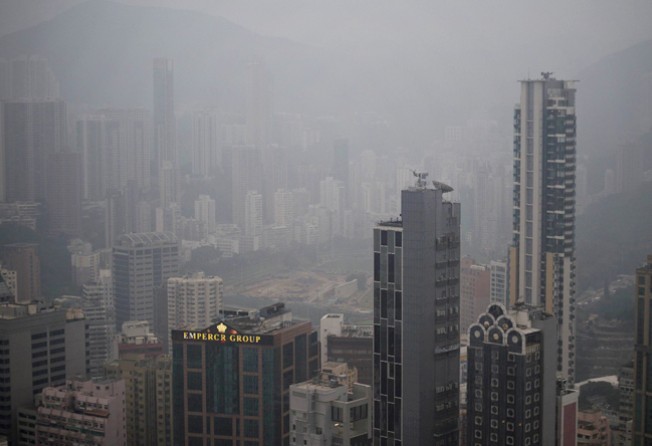Breathing dirty air is Hong Kong's lot, sadly
Jingan Young says one result of the Hong Kong government's inability to tackle pollution is that, sadly, we have come to regard dirty air as normal

There's something in the air, but it's not the smell of the approaching holiday season. Rather, it's the unwelcome return of smog which for the past week has hung over Hong Kong like a viscous cloak of invisibility. Recently, the concentration of one out of the four most threatening air pollutants, nitrogen dioxide, rose to 231.8 micrograms per cubic metre in Central, a level of concentration the World Health Organisation deems toxic and a cause of severe respiratory illness.
Hong Kong is now widely regarded as "smog city", ironic when you consider Hong Kong literally means "fragrant harbour". That's an unfortunate result of the government's inability to tackle the city's escalating environmental issues.
Across the border, things have been even worse, with the mainland reportedly suffering the worst air pollution in 52 years. Major highways, schools and construction sites were closed in over 100 cities. Flights were grounded in Shanghai. The internet was rife with exaggerated shock and horror tales of the smog's impact. Bloggers likened the coal-induced chaos to London's eponymous Great Smog of 1952.
This rude awakening came after Beijing's pledge to reduce sulphur dioxide emissions from power plants, and to set up a "monitoring network" in 16 worst-affected cities and provinces. Environmental officials blamed the "lack of strong wind".
Despite the dystopian furore coming out of the mainland, Hong Kong's workforce marched on. The city has become so accustomed to seeing its cinematic skyline shrouded in pollution, and treating blue skies as a beautiful happenstance, that we've pretty much stopped making a fuss.
At least the mainland's initial response to public criticism was to ban open-air barbecues in Beijing. This was followed by a restriction on car use based on licence plates; odd numbers can drive one day, even numbers the next. Hong Kong's solution? Phone apps to monitor air quality. With such information at their fingertips, Hong Kong people no doubt feel safer in the knowledge that they can easily discover when they are in toxic areas.
Hong Kong's Clear the Air, a non-governmental organisation established after the handover to help reduce air pollution through community schemes, apparently works with the government to find "practical solutions". However, even it agrees enough isn't being done. Hong Kong NGOs seem to struggle when it comes to dealing with our atypical bureaucracy - they get lost in the maze.
There are a few glimmers of light, though. In an effort to counter the government's ineffective air pollution index - to be replaced with more stringent standards (and accompanying app) at the end of the month - the Hedley Environmental Index was born. This website updates in real time the average pollution levels and its direct impact on the public's health as well as the financial losses. The tool records premature deaths (last month said to be 257), hospital bed days (12,852) and hospital visits (620,270). These delineations allow us to see the real health risks - and that should allow the government to put into play solutions to combat them.
So far, nothing. That's no cause to breathe easy.
Jingan Young is a freelance writer and the first playwright commissioned to write in English for the 2014 Hong Kong Arts Festival